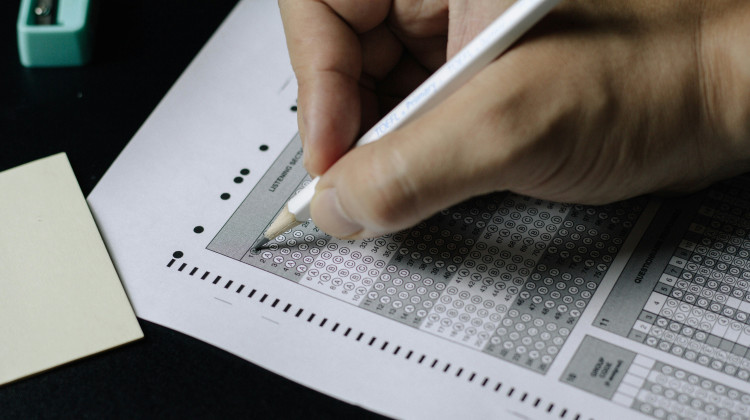Thea Bowman Leadership Academy in Gary is seeking a second chance from the Indiana Charter School Board after Ball State University declined to renew its 13-year-old charter over long-standing governance concerns
Thea Bowman Leadership Academy's high school campus in Gary. The Drexel Foundation for Educational Excellence faces default on the building if it isn't granted a new charter from the Indiana Charter School Board. Photo: Innovative Modular Solutions
Two Indiana laws intended to prevent failing charter schools from escaping closure or accountability through finding another sponsor could face their first test soon.
Thea Bowman Leadership Academy in Gary, one of the state’s oldest charter schools, is set to lose its charter this summer after sponsor Ball State University declined to renew it -- citing an ongoing lack of governance and fiscal concerns.
But the foundation managing the two Thea Bowman schools opted to not appeal, instead partnering with Indianapolis-based Phalen Leadership Academy to seek a new charter from the Indiana Charter School Board so it can continue operating -- a move they say is not the controversial practice known as “authorizer shopping.”
It’s a complex situation, say those involved, that combines politics, policy interpretations and the first application of two bipartisan laws -- including one that gives final approval of a charter sponsor switch to the State Board of Education.
“I think it does put both the charter board and the state board in an interesting position given the politics around it,” James Betley, Indiana Charter School Board executive director said this week. “And it’s not just the politics of people not understanding what the law says but it's just the politics of authorizer shopping in general.”
In addition to concerns and perceptions over “sponsor shopping,” there are other complicating issues surrounding Thea Bowman’s quest for a new charter, including:
- Ball State Office of Charter Schools says it’s likely to grant a provisional charter to a group of Thea Bowman parents if they can receive control of the school from the foundation that founded it.
- M. Karega Rausch, chairman of the Indiana Charter School Board, is a vice president for the National Association of Charter School Authorizers -- a group that recently rated Indiana’s charter accountability policies as top in the nation. Rausch may have to vote on whether to approve Thea Bowman’s request to change its authorizer -- a move that could cause a schism over what the definition of “authorizer shopping” is in the state.
- UMB Bank, the lender that holds the bonds for Thea Bowman high school, issued a letter last month saying the foundation violated terms of its December 2009 loan agreement and the loan will be in default if the charter is lost.
A few years ago a troubled charter school could “shop” for a new authorizer that may be, as lawmakers have said, more lenient in its oversight for how the schools were run or students fared academically.
In 2013 seven chronically failing schools were denied reauthorization from Ball State, yet three of the schools were granted new charters from a different authorizer to remain open.
Later that a year a law was passed requiring the State Board of Education to grant final approval for a school to get a different sponsor if they were at risk of losing its charter or already lost a charter.
So far, no cases have come before the Governor-appointed state education board.
Then in 2015, lawmakers drew praise for passing a law that sought to further clamp down the practice by, in part, requiring a school’s current or past authorizer to communicate with the proposed sponsor about problems facing the school.
As some lawmakers sought to balance charter school expansion and increase accountability, they left a path for a these non-traditional public schools to be granted a new sponsor or second chance.
That’s what Drexel Foundation for Educational Excellence Inc. is attempting to do. They’re the Gary nonprofit who founded the Thea Bowman Leadership Academy in 2003 and holds the charter. Today about 1,300 K-12 students are enrolled in its two schools.
Climate of Distrust And High Graduation Rates
Last year Ball State granted a one-year provisional charter renewal for Thea Bowman because of concerns over the governing board disregarding Indiana’s Open Door Law and not setting term limits for board members, among other issues.
An auditor hired by Ball State described the board as creating a “climate of distrust and uncertainty” at the schools, with vendors and among its members.
In a January letter Robert Marra, Ball State’s charter school office executive director, told Drexel Foundation that not enough improvements were made during 2015, including a complete restructure of the governing board and non-compliance with various federal Title funds.
It was “no longer in the best interest of the school’s students” or the community to renew the charter, Marra wrote. The charter expires June 30.
“They are trying to manage the school from a daily operation and that is not what boards do,” Marra said in an interview about the concerns over Drexel Foundation. “You want governance. You hire school leaders. You hire a management company. And those people run the daily operations. They are crossing over into that.”
Marra, says he does not want Thea Bowman to close but rather a different governing board to take over.
“The goal is to ensure that we have a high quality charter school in Gary,” he said.
Marra characterized the academic slide at Thea Bowman as “cause and effect” of the foundation’s board involvement in the schools -- a K-6 elementary and 7-12 high school.
In 2010 the two-school network was rated a C, in the past three year's its been graded a D on the state’s A-F accountability scale.
Pass rates for the math and English portion of the ISTEP+ dropped 12 percentage points between 2012 and 2014 to 51.9 percent. Last year 34.7 percent of students passed both parts of the exam. (Statewide ISTEP scores dropped by more than 20 percentage points in 2015 due to a change in the type of exam.)
Yet during the same time, the school’s graduation rate surpassed the state average and reached 94.7 percent in 2015. Last year, 98 percent of third graders passed the statewide reading test.
In sports, the popular boys’ basketball program won the 2010 Class A state championship and the 2013 Class 2A state championship.
Stick with Ball State
Mara believes a new governing board can bring stability and better oversight.
Ball State would consider granting a provisional charter to a parent-led group that would partner with Lighthouse Academies, a charter school network authorized by the university, to manage the school for 2016-17. During that year, Marra said, the new governing board could decide on a permanent school manager.
Taryl L. Bonds is one of the parents hoping to take control of the school from Drexel Foundation. Bonds helped form the nonprofit Alliance for Community Education and Economic Empowerment, or ACEEE Inc., to do just that.
“We want to keep our school with Ball State,” Bonds said. “We want the parents to understand that there is an alternative. That if the current board stopped this foolishness right now, the school would be open for the next school year. But with their plan, they still have to go through the Indiana Charter School Board and who knows what will happen."
Bonds, whose daughter is a Bowman eighth grader, says he considers the Drexel Foundation’s application to the Indiana Charter Board to be “charter shopping” because of the management problems and ethical concerns identified by Ball State during audits in 2013 and 2015.
'Change Is Good'
Initially, the Drexel Foundation said it would appeal Ball State’s nonrenewal decision but last month announced it would attempt to change authorizers instead.
During a Feb. 29 public meeting six board members agreed to resign effective March 31. Two members remained, including board president Keisha White who has been a member since last July, and three new members will be added.
“We take ownership of the governance issues,” White told WFYI Tuesday about Ball State’s concerns. “But 13 years later, any type of change is good for any organization. I think it is good for us to work with the Indiana Charter Board now. We need that change for our students.”
The proposed management partnership with Phalen Leadership Academy would improve the schools by helping identify permanent teachers and other vital staff, White said. In the past three years, two Thea Bowman principals and other school leaders have resigned or left for other jobs.
“It is about the children and my hope is that all stakeholders can unite for what is the best for the children,” White said.
White says Thea Bowman offers a vital alternative to the Gary Community School Crop. which is about $75 million in debt and rated F by the state.
If the application is approved, Phalen Leadership Academy would be the school’s educational service provider, basically a manager that would carry out the daily operations, from hiring staff to overseeing instruction.
This is similar to Phalen’s partnership with Indianapolis Public Schools at School 103. Last year Phalen opened the the first so-called “innovation school” in IPS by reconstituting the long-failing school under a contract with the IPS Board.
The flagship Phalen Leadership Academy, currently a K-4 school, was authorized by the Indiana Charter Board and has yet to receive a state A-F grade. Last November, the board approved the "activation" of three additional charters for Phalen.
Switching or Shopping?
Betley, the Indiana Charter School Board executive director, has fielded many calls about why the board is even considering Thea Bowman’s application.
Many, he said, believe Indiana law prohibits what Thea Bowman is doing. The board is bound to review each application, he continued, denying an applicant outright could be illegal.
“We are doing exactly what we have to do, independent of whatever Ball State has going on up there,” Betley said of the university's intent to partner with the parent group. “Frankly, regardless, of whatever Ball State thinks of the Drexel Foundation -- they are the actual charter holder.”
Yet at the same time, there are fresh concerns over “authorizer shopping” after a recent approval for Seven Oaks Classical School in Bloomington.
The Indiana Charter School Board denied a charter request for the school’s organizer in 2014. The school updated its application and reapplied to the board last year but withdrew its second application on May 20 before the board could vote again.
Then earlier this year the private Grace College and Theological Seminary approved a charter for the Seven Oaks Classical School in Bloomington during a non-public meeting.
Lawmakers on both sides of the aisle said they were troubled by Grace College’s secret approval and called out the lack of transparency. Though no law prevents a school organizer from repeatedly seeking its first charter.
“There is the legal issue and the perception issue,” Betley said about questions swirling around Thea Bowman’s lawful request. “Obviously that is weighing on the board members and they have to take that into consideration.”
Ball State’s Marra declined to answer whether he thought Drexel Foundation was attempting to skirt accountability by applying to the state charter board.
Testing The Laws
The National Association of Charter School Authorizers, or NACSA, is a proponent for shuttering charter schools if they have management problems or don’t perform. The group recently gave Indiana a perfect score for its state charter policy.
But in an analysis on Indiana, the NACSA's warned that the state's "sponsor shopping" laws had yet to be tested.
"Indiana will need to do the difficult work of enforcing authorizer sanctions if needed, especially if authorizer shopping continues. The law may need revisiting if the problem persists."
While NACSA is against sponsor shopping to evade accountability, its staff say state laws should allow legitimate reason to change sponsors.
“These cases are rare, but it is important to provide options to operators…,” reads a just released report, co-authored by M. Karega Rausch, the Indiana Charter School Board chairman. “Separating the acceptable from the problematic is a key area of judgment for authorizers to hone.”
Some of the acceptable cases include a school seeking to escape a “hostile or micromanaging” authorizer, or partnering with an authorizer better aligned with the school’s mission.
Rausch, NACSA’s vice president of research and evaluation, wrote in an email that board staff are aware of “national best practices specific to authorizer shopping that NACSA and others have written about.”
‘Undefined Process’
Another part of the 2015 law being tested is how a current and would-be authorizers communicate. Each sponsor must “consult” and provide “written acknowledgement” to the other about the school’s proposal – the intention is for authorizes to communicate concerns and history.
But earlier this week Betley said he’s had trouble obtaining documents from Ball State about Thea Bowman, including an unfilled request for a formal letter of deficiencies.
When asked about that claim, Ball State’s Marra said that was Betley’s “interpretation” of the matter.
Betley said this is an example of how the law is undefined when tested for the first time.
“Maybe we learn something from this and tighten the language up a bit to require some type of formal notice to the new authorizer to identify the deficiencies,” he said. “To make it a little easier and more transparent.”
So What Happens Next?
The Indiana Charter School Board staff is reviewing the Drexel Foundation’s application. That includes, internal and external reviews, interviews with the applicant and Phalen Leadership Academy, and a Tueday public hearing in Gary.
After that, the board staff will make a recommendation to the board members whether to approve or deny the request. The foundation will also be told of the recommendation, allowing them to withdraw the application if staff recomend it be denied.
No matter the recommendation, the foundation then decides whether to move forward to the board’s public vote. Betley said a meeting will then be scheduled quickly due to the time-sensitive nature.
If the Indiana Charter School Board approves the new charter, then they must defend the decision to the Indiana State Board of Education. The board, lead by Superintendent Glenda Ritz, would vote whether to approve the change of authorizer -- that could happen during the April 15 meeting.
If the charter is approved, Thea Bowman will remain open under new oversight. If the charter is denied, that leaves a possibility for Ball State’s alternative plan of the parent group to take control of the school.
Public hearing on Thea Bowman Leadership Academy's application is 5:30 p.m. CST March 22 at Thea Bowman Elementary, 975 W. 6th Avenue, Gary.
Public comments regarding the Thea Bowman application can be submitted through March 24 to: charter-applications@icsb.in.gov
Contact WFYI education reporter Eric Weddle at eweddle@wfyi.org or call (317) 614-0470. Follow on Twitter: @ericweddle.
 DONATE
DONATE









 Support WFYI. We can't do it without you.
Support WFYI. We can't do it without you.